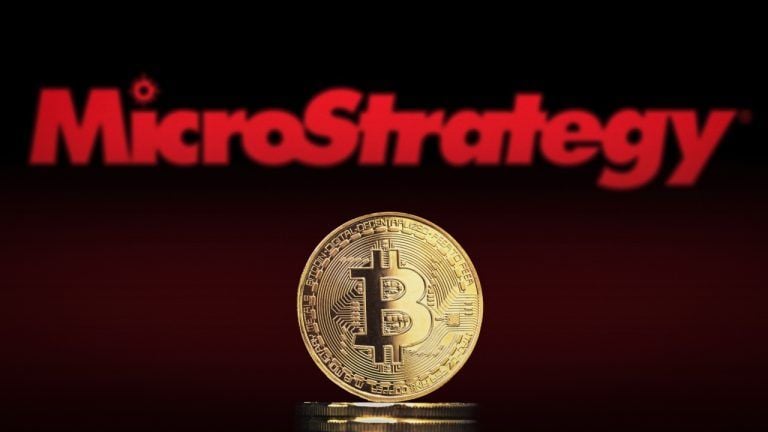
Michael Saylor says he’d be willing to advise Trump on crypto matters
Key Takeaways
- Michael Saylor is willing to advise Donald Trump on crypto matters if requested.
- MicroStrategy continues to focus on Bitcoin holdings as a primary value generation method.
Share this article
MicroStrategy co-founder and executive chairman Michael Saylor said Wednesday that he would be willing to provide advisory support to President-elect Donald Trump on crypto matters if asked.
“I’m always willing to provide a thought on constructive digital asset policy either in confidence or publicly. And if I’m asked to serve on some sort of Digital Assets Advisory Council. I probably would,” said Saylor, speaking on Bloomberg Open Interest.
While Saylor confirmed meeting with many people in the incoming Trump administration, he declined to provide further details.
The statement comes as MicroStrategy prepares to join the Nasdaq-100 alongside Palantir Technologies and Axon Enterprise, replacing Super Micro Computer, Moderna, and Illumina, effective December 23.
However, the company’s Bitcoin holdings could jeopardize its index position. MicroStrategy recently acquired an additional $1.5 billion in Bitcoin, bringing its total holdings to 439,000 BTC, valued at approximately $45 billion.
The massive Bitcoin stash might lead to MicroStrategy’s reclassification as a financial company in a March review by the Industry Classification Benchmark (ICB). This reclassification would likely result in the company’s removal from the Nasdaq-100, as the index exclusively comprises non-financial firms.
Addressing concerns surrounding MicroStrategy’s reclassification, Saylor asserted that the company is not solely reliant on its Bitcoin investments. The software division generates significant operating income, which he quantifies at about $75 million per year.
“We have a very healthy software division now and we’re very proud of it,” Saylor stated. He noted that he had no plans to spin off MicroStrategy. “It’s profitable and it’s a core part of the company’s identity.”
“We also think of ourselves primarily as a Bitcoin Treasury company now. So our primary method of generating shareholder value is through our Treasury operations,” Saylor noted.
“There are three ways to create value for shareholders; there’s operating income and our software business generates about $75 million a year of operating income. There’s also investment income that’s been difficult to track. But right now we have $18.6 billion of unrealized investment income,” he added.
Saylor noted that MicroStrategy “is engaged” in strategic acquisitions similar to practices seen in other tech companies like Apple.
MicroStrategy to reassess capital strategy after $42 billion Bitcoin target
MicroStrategy has acquired around $17 billion worth of Bitcoin since announcing its 21/21 plan to fund its future Bitcoin purchases. With this pace of accumulation, the company could reach its $42 billion Bitcoin acquisition target by January 2025.
When asked about potential adjustments to the plan, Saylor indicated that MicroStrategy would re-evaluate its capital allocation strategy once the $42 billion target is met.
“When we get through the 21/21 plan, which has $42 billion in capital, we’ll revisit our capital plan and we’ll put in place a new plan subject to market conditions at the time,” he said.
Saylor said that the company expects to lean more heavily towards raising capital through fixed-income markets in the coming quarter to increase leverage, which would enhance returns for its common stock shareholders.
While fixed income is the primary focus, they will also consider other options like preferred stock, convertible bonds, or equity-linked financings, depending on market conditions, according to Saylor.
Will the S&P 500 be next?
MicroStrategy’s substantial Bitcoin investment led to its inclusion in the Nasdaq-100, but its entry into the S&P 500 seems unlikely due to failing the index’s profitability requirements. The company has been profitable in only one of the past four quarters, a key criterion for S&P 500 inclusion, Bloomberg ETF analyst James Seyffart shared in a statement.
Despite this, upcoming changes by the Financial Accounting Standards Board may improve MicroStrategy’s financial reporting, according to the analyst.
Discussing MicroStrategy’s potential inclusion in the S&P 500, Saylor noted that the decision-making process and specific criteria are beyond his expertise. However, he expressed optimism about future prospects.
“I’m optimistic that in 2025, when we adopt fair value accounting, we end up with $50 billion of assets on our balance sheet, under fair value of Bitcoin goes up 20% a year, you’re looking at $10 billion a year of investment income,” Saylor said.
“I expect we’ll be generating billions of dollars a year or tens of billions of dollars a year of investment income, which becomes GAAP profitability,” he added. “I think that is the final thing people are looking for in inclusion in the S&P.”
Share this article
Go to Source
Author: Vivian Nguyen








